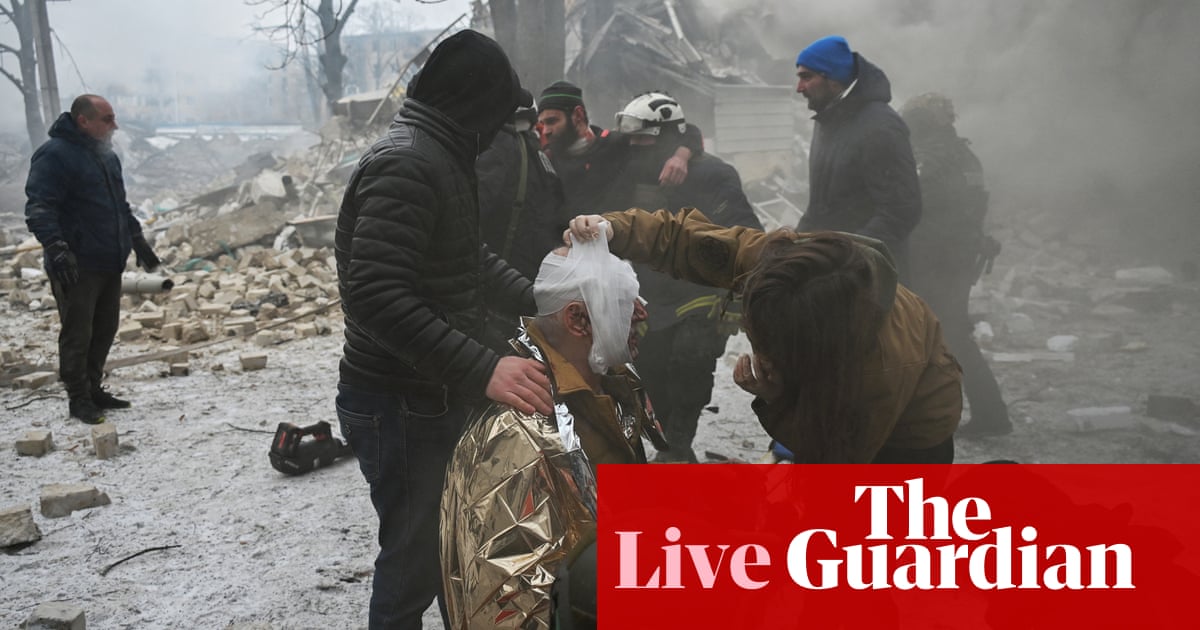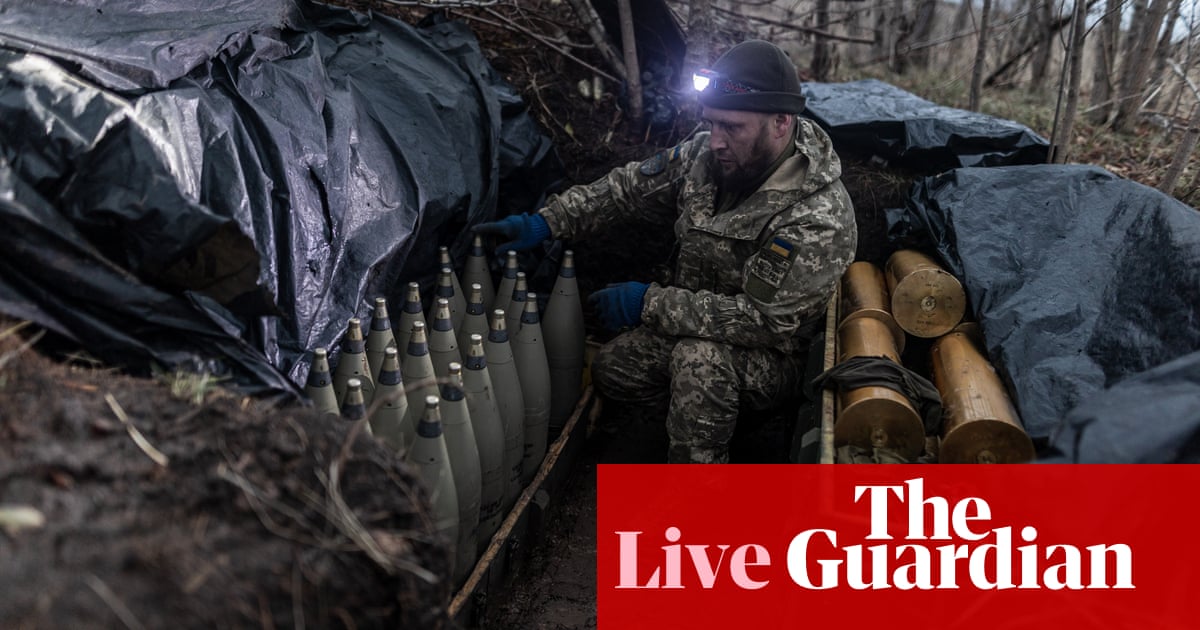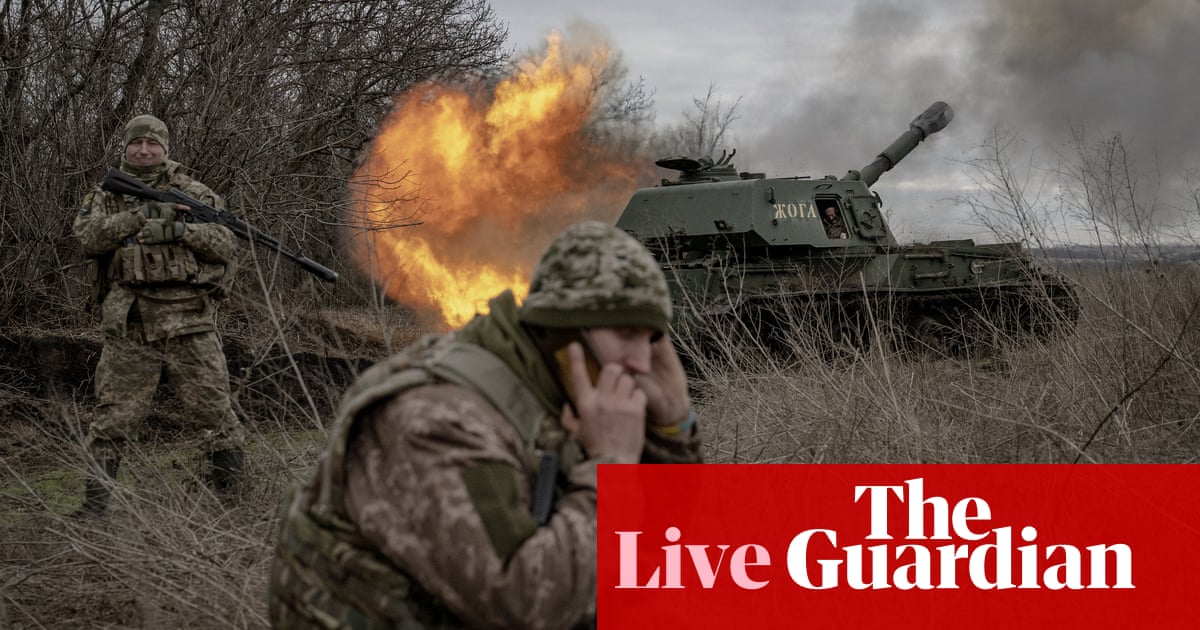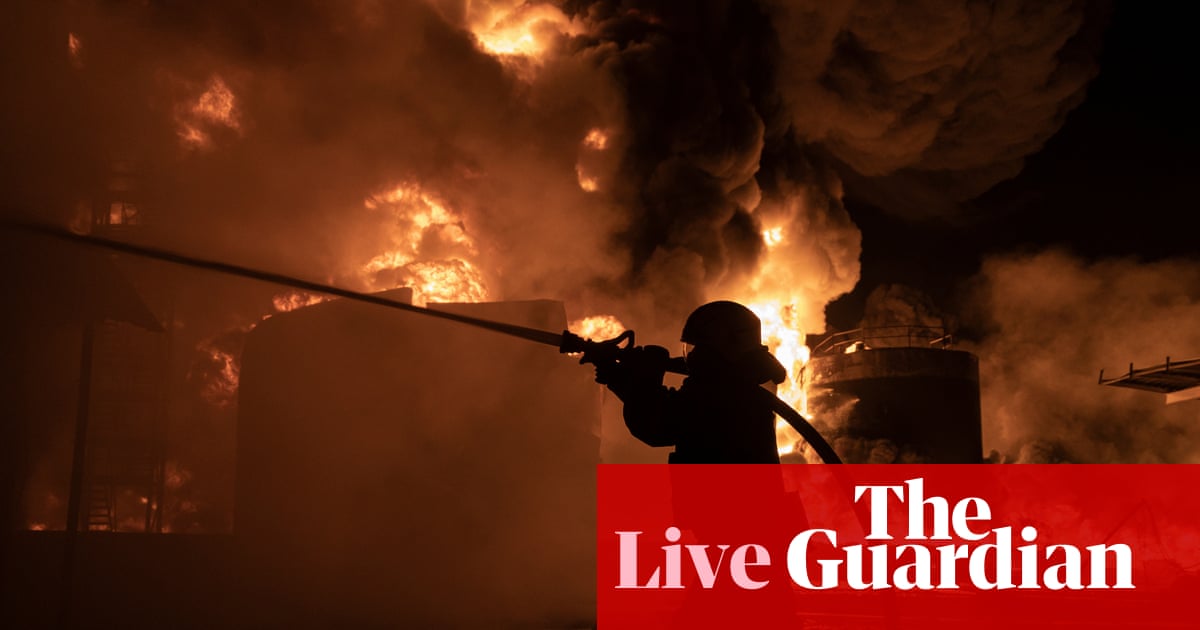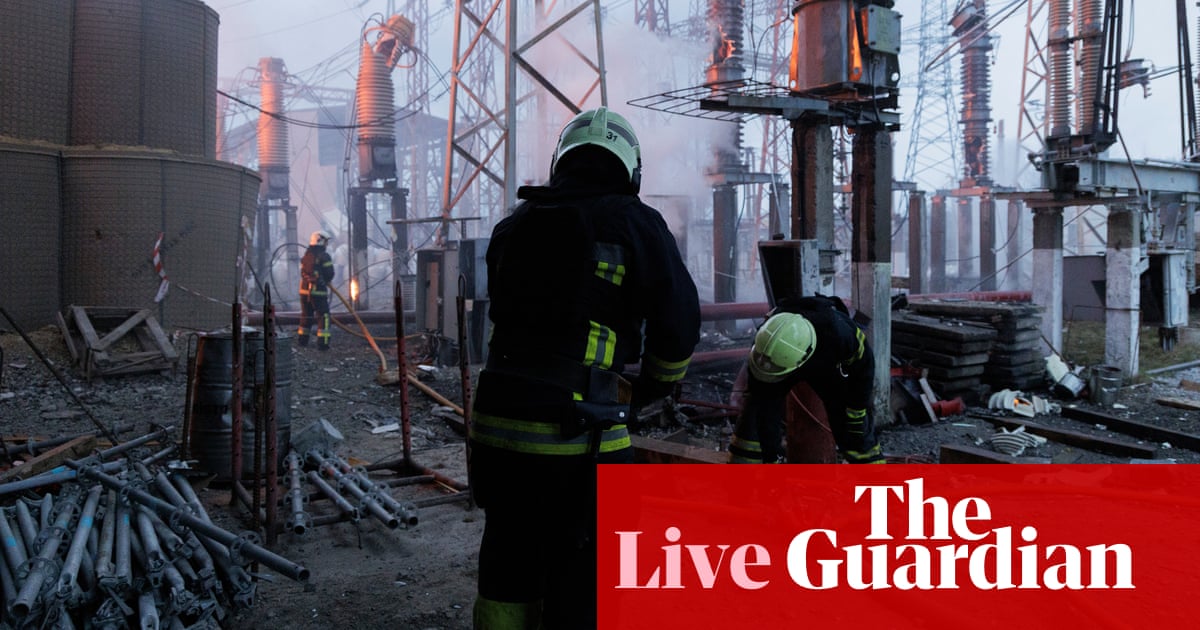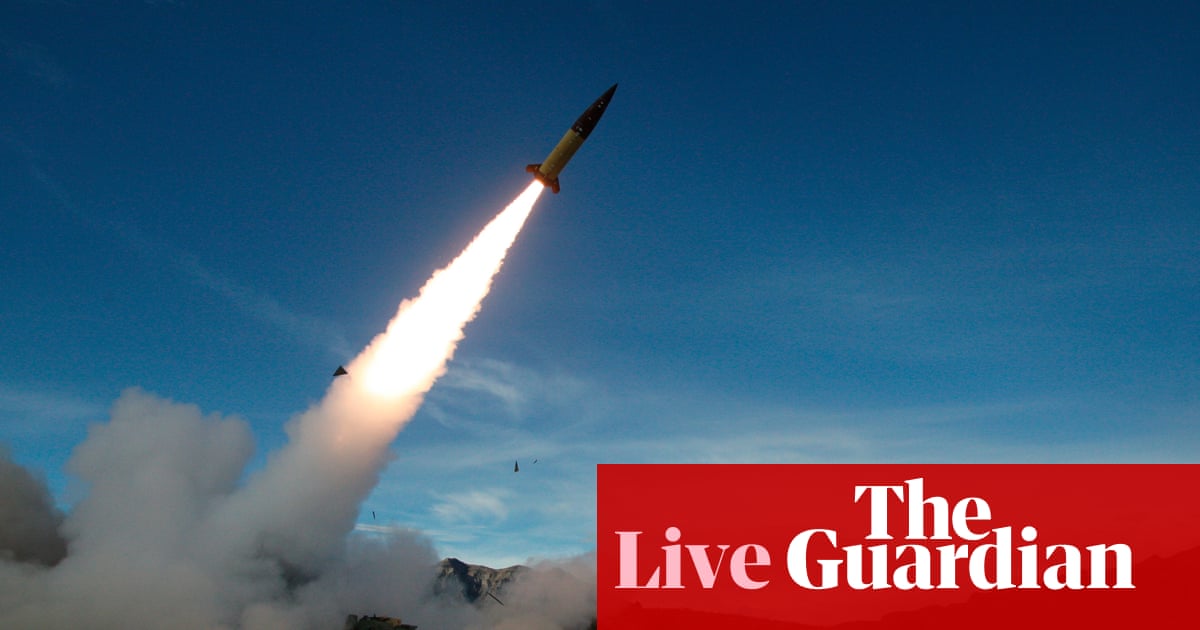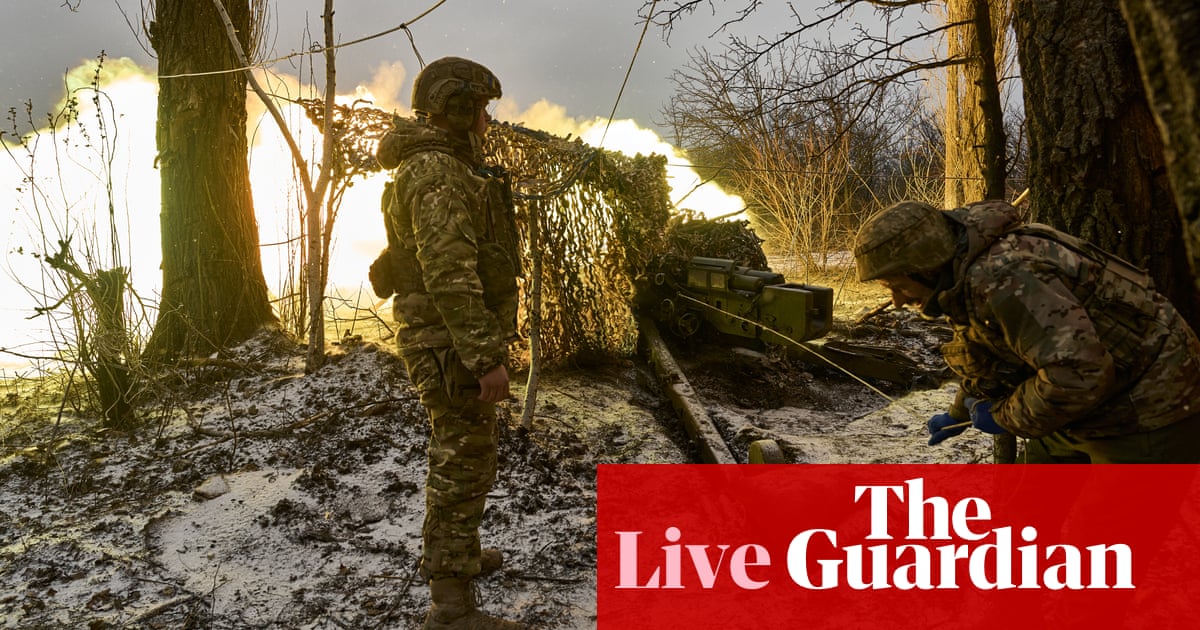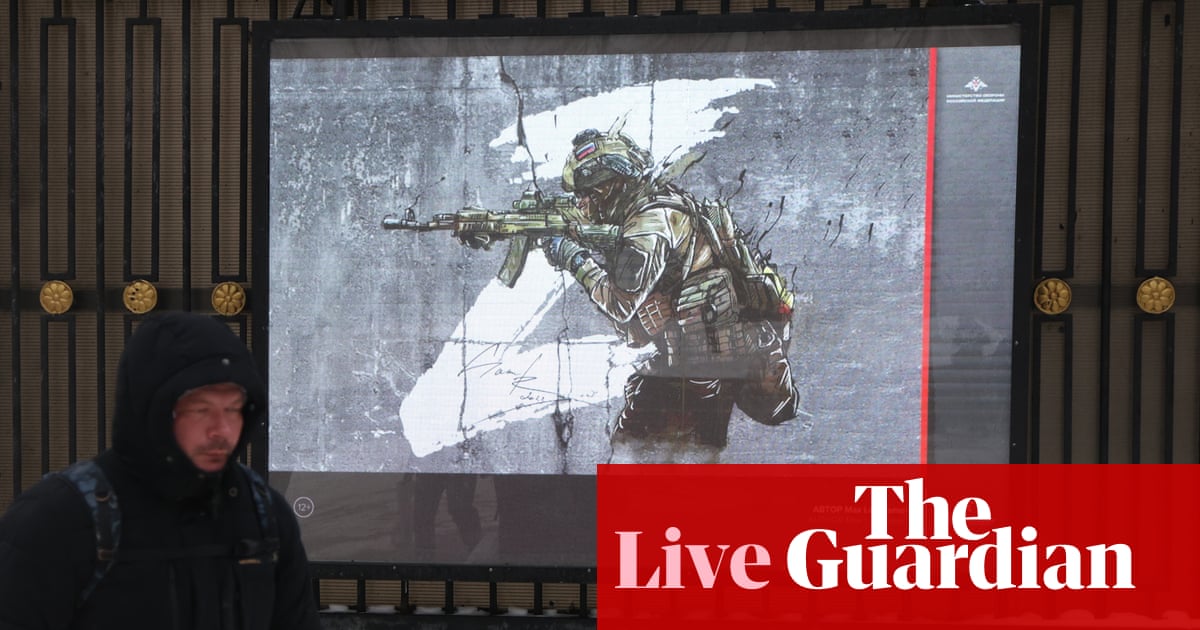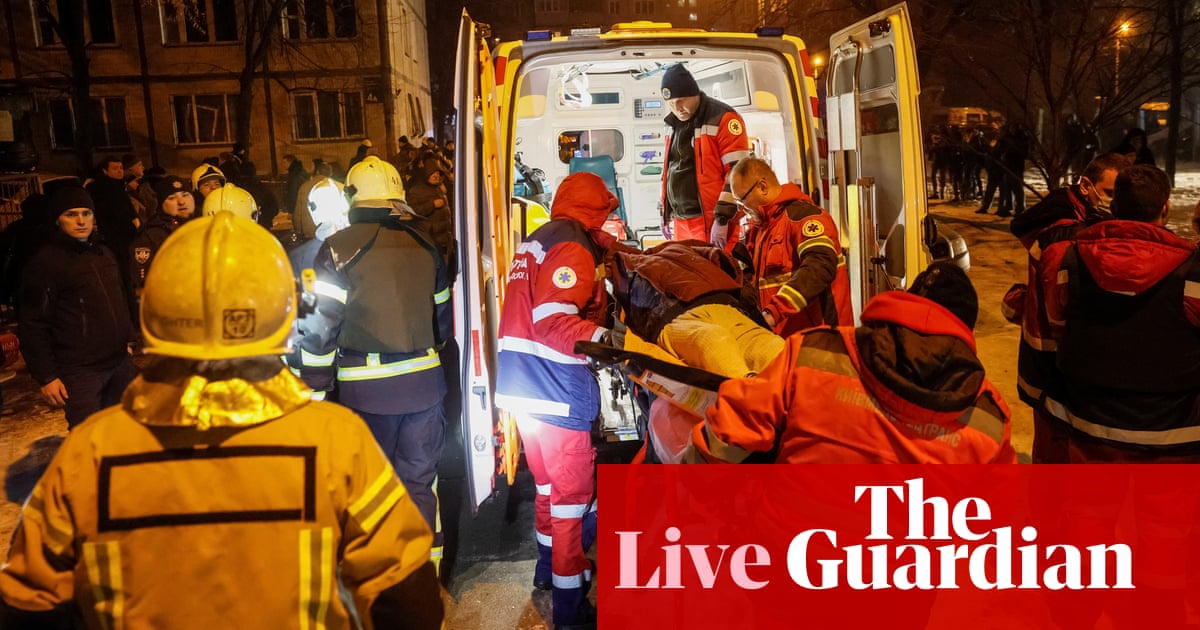
Russian attack on Kyiv injures dozens
A Russian missile attack overnight targeting the Ukrainian capital damaged a children’s hospital, with Kyiv’s mayor reporting at least 51 people injured in the “enemy attack”.
Ukraine’s air defence systems downed all 10 ballistic missiles targeting the capital at about 3am, it said on Telegram.
Falling debris caused injuries and destruction in four of Kyiv’s districts along the Dnipro River, which cuts through the capital. Debris hit several residential buildings in the Dniprovskyi district, injuring at least 51 people, including six children, officials said.
“As a result of the enemy’s night missile attack [on] the capital’s Dniprovsky district, an apartment building was damaged,” the Kyiv mayor, Vitali Klitschko, posted on social media, Reuters reports.
Windows and entrances were also shattered by debris at a children’s hospital in the Dniprovskyi district, but based on initial assessments, there were no casualties, Klitschko said.
Serhiy Popko, the head of Kyiv’s military administration, said on Telegram that the district’s water supply was also damaged.
It was Russia’s second missile assault on Kyiv this week. Ballistic missiles targeted Kyiv early on Monday and injured four people.
The attack came as:
Joe Biden warned the US Republicans that they would give Russia a “Christmas gift” if they failed to provide additional military aid to hat they would give Russia a “Christmas gift” if they failed to provide additional military aid to the Ukrainian president, Volodymyr Zelenskiy.
Zelenskiy had visited Washington on Tuesday to make an impassionaied plea to Congress to approve additional aid to fight Russia’s invasion.
In a joint press conference with Zelenskiy, Biden said: “Russian loyalists in Moscow celebrated when Republicans voted to block Ukraine’s aid last week. The host of a Kremlin-run show said: ‘Well-done Republicans, that’s good for us.’”
Good morning and welcome to our blog. I’m Caroline Davies and I will be keeping you up to date with the Ukraine related news over the next few hours. You can get in touch on caroline.davies@theguardian.com.
The blog is now closing. Thank you for reading.
Summary
Here is a summary of key events so far today.
A Russian missile attack overnight on the Ukrainian capital damaged residential buildings and a children’s hospital, with Kyiv’s mayor reporting that at least 53 people, including six children, were injured. Ukraine’s air defence systems downed all 10 ballistic missiles targeting the capital at about 3 am, he said on Telegram.
Debris hit several residential buildings in the Dniprovskyi district. At least 20 people were taken to hospital, including two children. Thirty-three civilians received treatment on the ground, the capital’s mayor, Vitali Klitschko, said.
In a statement on the Russian strikes on Kyiv overnight, Ukraine’s president, Voldymyr Zelenskiy, said: “There will be a response. Certainly.” Posting on X, he said: “Russia has proven once again that it is a heinous country that fires missiles at night, trying to hit residential areas, kindergartens and energy facilities during the winter. There will be a response. Certainly.”
Zelenskiy paid a surprise visit to Norway and said his critical priority was to strengthen Ukrainian air defence. At a summit with Nordic leaders, he said: “Today we talked and will talk about such specific things that can save thousands and thousands of Ukrainian lives, as well as increasing pressure on the aggressor,” as he called for more support for Kyiv in its war with Russia.
Hungary will stick to its stance that the EU must not start membership talks with Ukraine but should aim for a strategic partnership instead, its prime minister, Viktor Orbán, said. He also reiterated that the issue should be taken off the agenda of the bloc’s EU leaders summit in Brussels on Thursday and Friday, as Hungary will not approve the start of accession talks with Ukraine. Hungary opposes granting Ukraine more financial aid and has threatened to veto plans to advance its EU membership bid.
The European Commission president, Ursula von der Leyen, told the European parliament ahead of the summit: “As the war drags on, we must prove what it means to support Ukraine for as long as it takes.” Her commission wants the summit to take a decision this week to start EU membership talks with Ukraine once it meets the four outstanding conditions previously set out.
Zelenskiy has said the Hungarian prime minister, Viktor Orbán, had no reason to block Ukraine’s EU membership. Most of the EU’s 27 members want to open talks on Ukraine’s accession at a summit this week and agree billions of euros in further support for Kyiv in its war against Russia’s invasion. But both moves are being blocked by Hungary.
The US president, Joe Biden, has warned the Republicans that they would give Russia a “Christmas gift” if they failed to provide additional military aid to Ukraine.
Zelenskiy travelled to Washington on Tuesday to plead for money to back Ukraine in its war with Russia, but he faced a sceptical reception from key Republican lawmakers. Mike Johnson, the speaker of the House of Representatives, would not agree to support Biden’s request to give Ukraine $61.4bn, with objectors insisting on White House concessions on border security as a condition for a deal.
Biden announced an additional $200m military aid package and, amid concerns that the war had reached a stalemate, insisted that Ukraine has made significant progress. “I will not walk away from Ukraine, and neither will the American people,” Biden said.
Zelenskiy has insisted he received a “positive signal” during his trip to Washington this week that the US would continue its support and assistance to Ukraine – despite suggestions that it could be losing support from its staunchest ally. He said he was confident of the US’s backing. Citing conversations with “congressmen, senators, representatives of both parties, with administration of the president and with him personally, from the speaker of the United States” he said: “I received a positive signal concerning support of Ukraine and assistance from the side of the United States.”
Norway will donate 3 billion crowns ($273 million) to Ukraine , prime minister Jonas Gahr Støre told a joint press conference with Zelenskiy on Wednesday. The funds are part of a package agreed previously by Norway’s parliament, of 75 billion crowns (£5.5bn) over 5 years.
Denmark’s government will present a new support package for Ukraine worth €1bn (£860,000) to parliament on Thursday, prime minister Mette Frederiksen said on Wednesday at a press conference with Nordic leaders and Zelenskiy in Oslo.
Ukraine’s biggest mobile network operator, Kyivstar, aimed to restore some of its services later on Wednesday after an “unprecedented” cyber-attack, the company’s chief executive, Oleksandr Komarov, said. Ukraine’s SBU intelligence agency told Reuters it was investigating the possibility that Russian security services were behind the attack. Moscow had no immediate comment.
Zelenskiy has also met the prime minister of Iceland, Katrín Jakobsdóttir.
Denmark’s government will present a new support package for Ukraine worth €1bn to parliament on Thursday, the prime minister, Mette Frederiksen, said on Wednesday at a press conference in Oslo with Nordic leaders and the Ukrainian president, Volodymyr Zelenskiy, in Oslo.
Volodymyr Zelenskiy has said he received a “positive signal” during his trip to Washington this week that the US would continue its support and assistance to Ukraine – despite suggestions that it could be losing support from its staunchest ally, writes Miranda Bryant.
Speaking in Oslo at a meeting with Nordic leaders on Wednesday, the Ukrainian president admitted there may be timing issues and internal politics, but that he was confident of US support.
His comments came after he struggled to persuade US Republicans on Tuesday to support a $61bn military aid package for Ukraine, prompting suggestions that Ukraine could not rely on continued support from the US, which to date has has been its largest provider of military assistance.
But Zelenskiy said he was confident of the US’s backing. Citing conversations with “congressmen, senators, representatives of both parties, with administration of the president and with him personally, from the speaker of the United States” he said: “I received a positive signal concerning support of Ukraine and assistance from the side of the United States.”
Speaking alongside the prime ministers of Norway, Sweden, Iceland, Finland and Denmark, he added: “There is a matter of timeframe, there is a matter of the internal political situation, it goes without saying that it takes place, but we all have sureness.”
Responding to criticism that Ukraine ought to defend itself rather than be on the offensive, he insisted that his country is not in crisis in its war with Russia.
“In terms of claim of the generals of the United States and some personalities, several military people, I should say that in any case it is not about crisis,” he said. “It is about winter. And during wintertime we always have a slowing of one or other operations, counter offensive or defensive, doesn’t matter.”
Ukraine has had “huge success” on sea, he said, highlighting his military’s work on the Black sea, adding: “Therefore we have to be prepared for further operations.”
He said that the rest of Europe should follow the example of the Nordic countries in their support for Ukraine, saying: “What Europe can do, do the same as what Nordic countries do.”
Citing a recent conversation with the Hungarian prime minister, Viktor Orbán, who on Wednesday doubled down on his opposition to EU accession talks with Kyiv, Zelenskiy said he had asked him for one reason for blocking Ukrainian EU membership and that he is “still waiting for an answer”.
Nordic leaders highlighted this is a “crucial point” in the war as they announced how they would be sending new support packages to Ukraine as they pledged continued support for “years” ahead.
Jonas Gahr Støre, the Norwegian prime minister, said the countries had discussed how they could “confirm, maintain and increase our support to Ukraine at this very critical moment of Ukraine’s fight for its own independence and freedom.” He pledged to continue their support “for the long run”, adding: “President Zelenskiy, we support your peace formula.”
Petteri Orpo, the Finnish prime minister, urged more European countries to take industrial production of armament seriously, as his country announced it would be doubling its own production. “Times have changed”, he said, urging Europe to adapt.
Russian investigators have opened a new criminal case against a Russian-American journalist being held in detention, accusing her of spreading false information about the Russian army, according to a state-affiliated media outlet.
Reuters reports:
Alsu Kurmasheva, a journalist for Radio Free Europe/Radio Liberty (RFE/RL), has been in custody since Oct. 18 after being briefly detained in June while trying to fly out of Russia after visiting her mother. Her employer said she was being unfairly and cruelly persecuted.
Kurmasheva, the second U.S. media representative to be held in Russia since the start of the Ukraine war in February 2022, is being held in pre-trial detention – so far scheduled to end on 5 February – in her native Russian region of Tatarstan.
A court first found her guilty of failing to declare that she had a US passport, mandatory under Russian law, and fined her. She was then accused of failing to register as a “foreign agent”, an offence that carries up to five years in jail and one she has pleaded not guilty to.
According to Tatar-Inform, a state-affiliated media outlet which has suggested that she is also formally accused of deliberately gathering military information that could be used against Russia, state investigators opened a new criminal case against Kurmasheva on 11 December.
It said the new case centred on a book which the Prague-based journalist had edited which pulled together the stories of Russians who oppose the Ukraine war.
Her editing and promotion of the book was seen by state investigators as amounting to deliberately distributing false information about the Russian army out of political hatred, Tatar-Inform reported. Such an offence is punishable by up to 10 years in prison.
There was no immediate comment from Russian authorities on the Tatar-Inform report.
Radio Free Europe criticised Kurmasheva’s treatment. “We strongly condemn Russian authorities’ apparent decision to bring additional charges against Alsu,” RFE/RL acting president and board member Jeffrey Gedmin said in a statement. “Journalism is not a crime. It is time for this cruel persecution to end. Alsu has already spent 56 days unjustly detained and separated from her family.”
Zelenskiy has said the Hungarian prime minister, Viktor Orbán, has no reason to block Ukraine’s EU membership.
Most of the European Union’s 27 members want to open talks on Ukraine’s accession at a summit this week and agree billions of euros in further support for Kyiv in its war against Russia’s invasion. But both moves are being blocked by Hungary.
Zelenskiy who is visiting Norway for talks with Nordic countries’ leaders on more help to Ukraine also said that battlefield operations always moved slower in winter.
Denmark’s prime minister, Mette Frederiksen, said her government would present a new support package for Ukraine worth €1bn to parliament on Thursday.
Leaders of the five Nordic nations, key backers in Kyiv’s fight against Russia’s invasion, have commenced a press conference in Oslo.
Slovakia is ready to support opening of European Union accession talks with Ukraine at an EU summit this week, Prime Minister Robert Fico said on Wednesday.
Fico told a parliamentary committee that Slovakia was also ready to agree financial assistance for Ukraine from the EU, or from EU countries bilaterally if there is no EU unanimity, if certain Slovak demands are met.
Ukrainian president Volodymyr Zelenskiy said his critical priority was to strengthen Ukrainian air defence.
“Today we talked and will talk about such specific things that can save thousands and thousands of Ukrainian lives, as well as increasing pressure on the aggressor,” Zelenskiy told a joint news conference with Norwegian prime minister Jonas Gahr Stoere and other Nordic leaders in Oslo, as he called for more support for Kyiv in its war with Russia.
Russia struck the Ukrainian capital Kyiv with ballistic missiles in the second such attack so far this week. Zelenskiy said that Russia targeted civilian infrastructure in the overnight attack.
Stoere said that Norway will donate 3 billion crowns ($273m) to Ukraine. The funds were part of a package agreed previously by Norway’s parliament, of 75 billion crowns over 5 years.
“Norway will continue to support Ukraine fight to defend itself. We are providing targeted, long-term support to assist Ukraine in its battle for freedom and democracy,” Stoere said in a statement.
“Ukraine’s efforts are important to safeguarding freedom and security here in Norway as well.”
Ukraine’s biggest mobile network operator, Kyivstar, aims to restore some of its services later on Wednesday after an “unprecedented” cyber attack, the company’s CEO, Oleksandr Komarov, said.
Tuesday’s attack on Kyivstar, which has 24.3 million mobile subscribers and more than 1.1 million home internet subscribers, knocked out services, damaged IT infrastructure and air raid alert systems in some of the regions. It appeared to be the largest attack since Russia’s full-scale invasion of Ukraine in February 2022, Reuters reports.
“We expected that we would be able to return some services in the first half of the day today. We see that this will not happen, but we are moving towards starting to restore some services in the second half of the day,” Komarov said in televised comments.
Ukraine’s SBU intelligence agency told Reuters it was investigating the possibility Russian security services were behind the attack. Moscow had no immediate comment.
Here are some of the images from the newswires of the damage caused by the overnight strikes on Kyiv.
Kyiv has increased pressure on the EU to open accession talks at a crucial summit this week, with Volodymyr Zelenskiy’s most senior adviser warning that without his country “the ‘Europe puzzle’ cannot come together”.
After the European Commission’s recommendation last month that formal membership talks begin, the EU’s 27 heads of government are due to discuss the proposal at a meeting in Brussels on Thursday and Friday.
But there is increasing concern in Kyiv that repeated threats by Viktor Orbán, the Hungarian prime minister, to veto Ukraine’s membership could lead to the decision being deferred.
Now, in a fresh appeal to member state leaders, Zelenskiy’s chief of staff, Andriy Yermak, has urged EU countries to recognise that Ukraine has “much to offer” the bloc.
Yermak said: “Values-wise and ideologically, Ukraine is an indisputable part of Europe – which is precisely why Russia attacked us. We want to be part of the EU, and membership is one of the key priorities of our state policy. However, we are aware that willingness alone is not enough.
“Ukraine has demonstrated the ability to undergo rapid transformation … We are geared towards a highly constructive dialogue regarding accession and count on a similar approach from our partner countries. Without Ukraine, the ‘Europe’ puzzle cannot come together.”
A North Korean minister met the governor of the Russian region bordering the two countries to discuss boosting regional economic cooperation, state media KCNA reported on Wednesday, the latest exchange between the neighbouring states.
Reuters reports:
The talks between North Korea’s external economic relations minister Yun Jong Ho and Oleg Kozhemyako, governor of the Russian far eastern region of Primorsky, focused on “elevating economic cooperation to a higher level,” it said.
The KCNA report also said the trade and economic working groups of the two sides signed an agreement but it did not provide details of that or the meeting between the officials.Primorsky is also known informally as Primorye.
The meeting comes as South Korea’s spy agency said on Tuesday there had been signs that North Korea was moving to deploy workers to Russia, according to the Yonhap news agency.
Any country employing North Korean workers who earn wages would be violating U.N. Security Council sanctions aimed at curbing Pyongyang’s banned weapons programs on grounds the earnings can be channeled to finance the projects.
“This is the first visit after a long break caused by the pandemic,” Kozhemyako said on his Telegram channel. “Our delegation*s program includes many meetings to develop humanitarian ties between Primorye and the DPRK. First of all, in the field of culture, tourism and sports.”
In November, Kozhemyako told the Russian TASS state news agency that Primorye was ready to consider the possibility of providing part of its agricultural land for farming by North Korean farmers.
Kozhemyako’s visit marks the latest in a flurry of bilateral visits since North Korean leader Kim Jong-un visited Russia in September and met President Vladimir Putin to discuss deepening military cooperation.
That pledge came in the backdrop of what U.S. officials said was evidence of arms trade between the North and Russia, which is expending vast amounts of munitions in its war with Ukraine.




